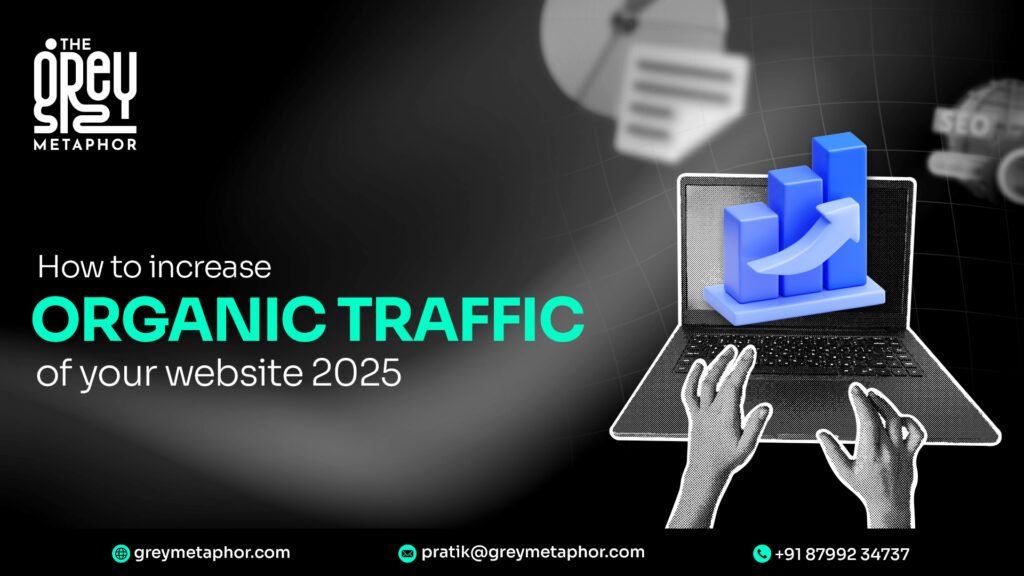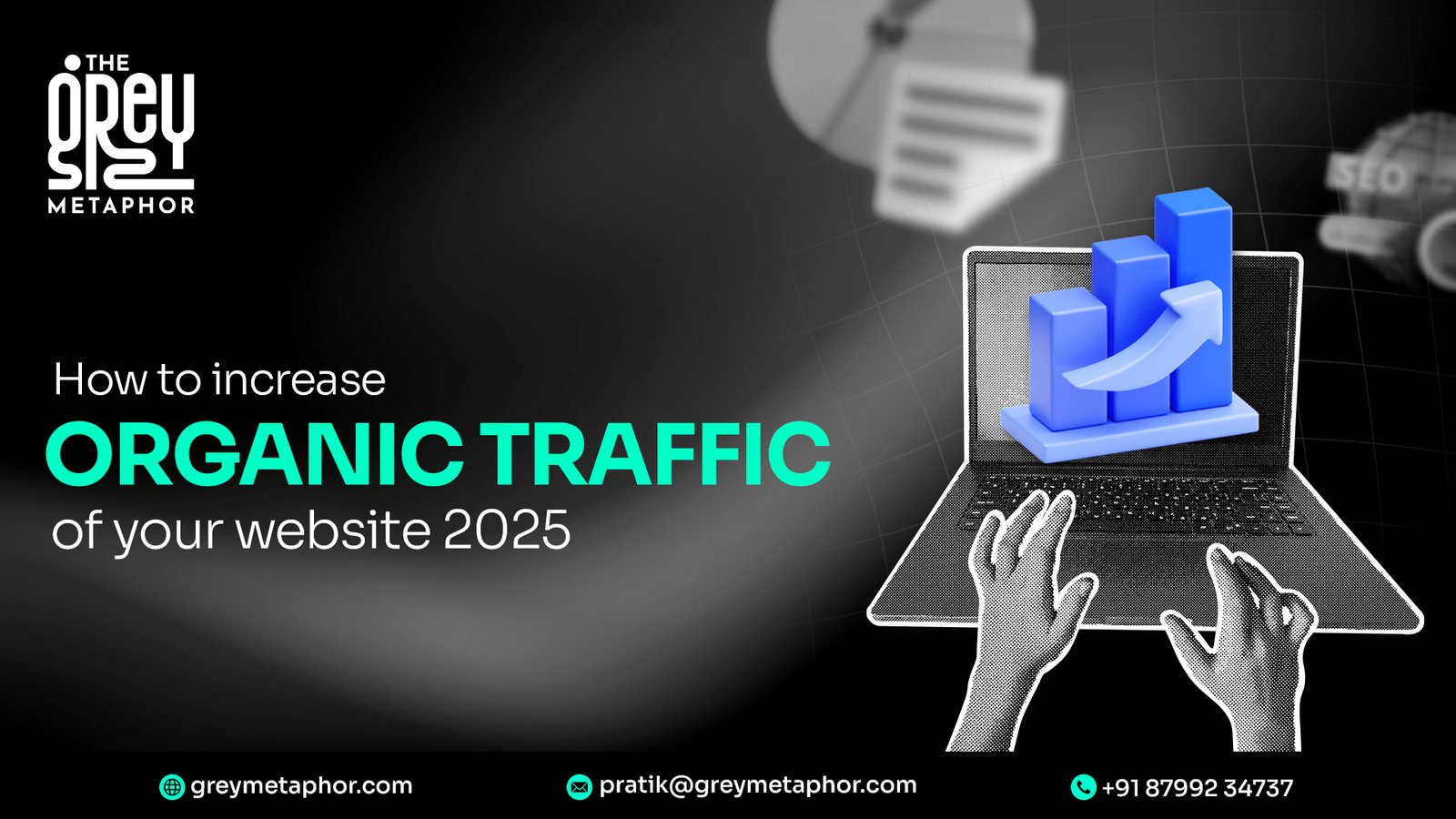In today’s ever-evolving digital landscape, increasing organic traffic remains a top priority for businesses of all sizes. With the rise of AI-driven search, voice queries, user-intent-focused algorithms, and zero-click SERPs, the rules of SEO are more sophisticated than ever. So how do you stand out and increase your website’s organic visibility in 2025?

Let’s break down the key strategies and best practices you should implement to sustainably grow your organic traffic this year.
1. Prioritize User Intent Over Keywords
Search engines like Google now prioritize search intent—not just keywords. Instead of focusing solely on keywords like “best digital marketing agency,” think about what the user really wants:
- Are they researching?
- Are they ready to buy?
- Are they comparing options?
Action Tip:
Map every content piece to a specific stage in the user journey (awareness, consideration, decision). Use tools like Answer the Public or AlsoAsked to discover how real users phrase questions.
2. Update and Expand Existing Content
One of the fastest ways to boost rankings is to refresh underperforming or outdated content. In 2025, Google favors fresh, comprehensive, and well-structured information.
Action Tip:
- Use Google Search Console to find declining pages
- Add new FAQs, examples, internal links, and media
- Reoptimize headers, meta descriptions, and schema
This not only improves relevance but helps your content reclaim rankings.
3. E-E-A-T Signals: Showcase Real Expertise
Google’s algorithm now weighs Experience, Expertise, Authoritativeness, and Trustworthiness (E-E-A-T) more than ever. Your content must demonstrate:
- Hands-on experience (e.g. “we tried this strategy”)
- Author credibility (bio pages, LinkedIn links, author schema)
- Trust factors (reviews, SSL, transparent contact info)
Action Tip:
Create author pages with credentials, add testimonials, and embed real case studies. If you’re an agency, showcase actual campaign data.
4. Optimize for AI Search and Featured Snippets
In 2025, AI-generated answers and featured snippets are eating up the top of the SERP. You must create content that answers questions clearly and directly.
Action Tip:
- Use concise, 40-60 word definitions or lists
- Structure content with proper H2s/H3s for AI parsing
- Add FAQs using Schema.org markup
This increases your chances of being featured in Google’s Search Generative Experience (SGE) and AI engines like Perplexity or Bing Copilot.
5. Build Topic Clusters, Not Just Posts
Search engines now favor semantic depth. That means your content strategy should revolve around topical authority rather than isolated blog posts.
Action Tip:
- Identify 5–6 key themes (e.g., “SEO”, “Content Marketing”, “Email Automation”)
- Create a pillar page + 5–10 cluster blogs per topic
- Internally link each supporting post to the main pillar
Not only does this help Google understand your expertise—it also keeps users engaged.
6. Focus on Core Web Vitals & UX
Technical performance affects organic rankings. In 2025, Core Web Vitals like LCP, CLS, and INP are mandatory for competitive sites.
Action Tip:
- Use PageSpeed Insights to measure vitals
- Optimize image loading with WebP format
- Ensure mobile-first, accessible design with smooth interactivity
A fast and clean website not only pleases Google—it reduces bounce rates and boosts conversions.
7. Win Backlinks Through Authority, Not Outreach
Link building in 2025 is less about mass outreach and more about content that earns backlinks through genuine value.
Action Tip:
- Publish original data, industry research, or trend reports
- Contribute thought leadership on high-DA websites
- Use HARO, Help a B2B Writer, and podcast guesting to build visibility
Search engines now reward natural, editorial links—so your content needs to deserve them.
8. Don’t Ignore Long-Tail & Zero-Volume Keywords
Tools like Ahrefs or SEMrush may overlook long-tail, low-volume queries—but AI search engines and voice assistants won’t. These intent-rich searches often convert better.
Action Tip:
- Use tools like Keyword Insights or Google’s “People Also Ask”
- Create content around micro-topics and sub-queries
- Use conversational phrasing (“how do I,” “best way to,” etc.)
9. Strengthen Internal Linking
Internal linking signals topical relevance and improves crawlability. Google uses internal links to identify content hierarchy and distribute page authority.
Action Tip:
- Link related blogs and service pages contextually
- Add breadcrumb navigation
- Use descriptive anchor text (not just “click here”)
A well-linked site keeps users engaged—and reduces dependence on backlinks.
10. Use AI and Human Collaboration for Scalable SEO
AI can accelerate your SEO workflow—but it must be paired with human insight to produce quality, originality, and accuracy.
Action Tip:
- Use ChatGPT for content outlines, metadata, and ideation
- Validate every piece with expert input or first-hand experience
- Automate audits, not decisions
Brands that combine AI with storytelling, visuals, and UX will outperform those using automation alone.
Final Thoughts
There are no shortcuts in SEO anymore. The brands that will win in 2025 are those investing in:
- Deep expertise
- Real-world relevance
- Consistent, optimized content
- Technical excellence
- Smart architecture
If you’re looking to scale your digital footprint without relying on paid ads, start by building strong content foundations and user trust.
For a performance-driven SEO strategy that aligns with modern algorithms and user behavior, explore how Grey Metaphor can help you grow.
Written by the SEO & Strategy team at Grey Metaphor – where organic meets impactful.

